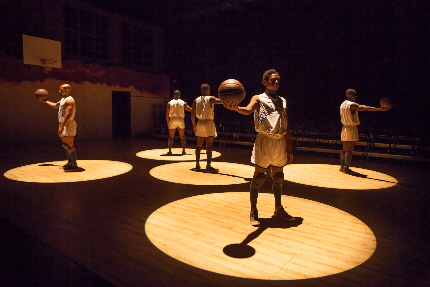
Kings of Harlem from M Ensemble
By Bill Hirschman
South Florida has long been home to minority-dominated theater companies as well as productions in which race was a central theme. But the Carbonell Award nominations for 2017 released this morning underscore how opportunities have grown specifically for African-American artists in the region and for audiences interested in their work.
This was especially evident in the seven nominations for M Ensemble, reportedly the oldest continually operating African-American company in existence in the state.
The 47-year-old troupe has struggled in recent years, economically and artistically, as it moved from venue to venue across Miami-Dade County. But it finally settled last year into a permanent home in the new Sandrell Rivers Theatre in north Miami and a renaissance was immediately apparent.
Click here to read a complete list of 2017 Carbonell Award nominations and breakdown by show, theater and county.
Its very first production there, the basketball-themed Kings of Harlem, took five nominations including best play, best ensemble, best scenic design for Mitchell Ost, best supporting actor for Andre L. Gainey and best director for the show’s creator Layon Gray. Its subsequent revival of Flying’ West earned a best supporting actress in a play nod for the venerable Carolyn Johnson. Another revival, Brothers of the Dust, garnered a supporting actress in a play nomination for up and coming Rita Joe.

Sarah Gracel
In fact, at least 10 African American artists scored nominations among the 20 categories including: best actress in a play for Karen Stephens’ turn as an urban Mother Courage in Theatre Lab’s Motherland; Elijah Word recognized as the electrifying James Thunder Early in Broward Stage Door’s Dreamgirls as a candidate for best supporting actor in a musical; Marckenson Charles for best actor in a play as part of the brother act in Zoetic Stage’s Topdog/Underdog; a best actress in a musical nod to Sarah Gracel as Effie, the aggrieved heroine with a hurricane voice in Dreamgirls, and Ron Hutchins for his choreography in Actors Playhouse’s Evita.
The winners as well as special honors and scholarship recipients will be announced during the ceremony at 7:30 p.m. Monday, April 2, at the Broward Center for the Performing Arts. Nicknamed “Theater Prom” by the thespian community, the ceremony is open to the public. Veteran director/choreographer Kevin Black will be producing and directing the show for the first time this year.
As always, major powerhouses gathered the most nominations: the Maltz Jupiter Theatre with nine recognizing its production of Newsies and Gypsy, and Zoetic Stage whose 17 nominations were the result of every show in its season: ¡FUÁCATA! , The Caretaker, Sunday in the Park With George and Topdog/Underdog.
But the work of less high-profile troupes were honored as well. In Fort Lauderdale, Thinking Cap Theatre’s mountings of Lizzie the Musical, Straight White Men, Grounded and Collective Rage produced at least one nomination connected to every major project it produced this season.
New City Players, which rents space in Thinking Cap’s home of the Vanguard, hosted a best actor in a supporting role for Kevin Reilley’s Malvolio in Twelfth Night. Ground Up & Rising, the peripatetic company last housed at South Miami Dade Cultural Arts Center, did similar honors for Gregg Weiner as best actor in a his first one-man show as the mesmerizing title character in Ground Up & Rising’s play for The Good Thief.
The best new work category shone attention on two other modest companies: the West Boca Theatre Company, which produced Michael McKeever’s Holocaust play The Camp, and J’s Cultural Arts Theatre, which host Ben Andron’s tale of dark family secrets, Broken Snow.
Miami-Dade theaters earned 42 nominations, Palm Beach County earned 38 nominations and Broward County earned 20 nominations. Nominations were spread over 44 shows from theaters stretching from Coral Gables north to Jupiter.

Tom Wahl & Clay Cartland in The Legend of Georgia McBride
The quality of local talent was especially apparent in several tight tough races. In a better world, the best actor in a play category would be a five-way tie: Weiner in The Good Thief; Clay Cartland investing heart and humor as a Panhandle Elvis impersonator who reluctantly makes end meet as a drag queen in GableStage’s The Legend of Georgia McBride; Charles as Booth in Zoetic’s Topdog/Underdog, Nicholas Richberg as the flamboyant Tennessee Williams in Billy & Me at Palm Beach Dramaworks, and veteran David Kwiat inhabiting the garrulous and scruffy homeless man in Zoetic’s The Caretaker.
It was the same among the five candidates for best actor in a musical: Shane Tanner giving a fresh frightening turn in Dramaworks’ steampunk vision of Sweeney Todd; Bruce Linser as a touching Man in the Chair in The Wick Theatre’s The Drowsy Chaperone, Cooper Grodin as Seurat in Zoetic’s Sunday in the Park With George, and competing against himself, Michael Ursua as an atypically vulnerable Albin/Zaza in MNM Productions’ La Cage aux Folles and as the emotionally ravaged Archibald in Slow Burn’s The Secret Garden.
The nominees for best actress in a play are just as daunting a field: Stephens in Motherland, Joe in Brothers of the Dust, Elena Maria Garcia for playing two dozen Latina women in Zoetic’s original ¡FUÁCATA!, which she co-wrote, Niki Fridh for her one-woman turn as a sidelined pilot in Thinking Cap’s Grounded, and Anne-Marie Cusson as the aging writer in Dramaworks’ Collected Stories.
The region’s growing reputation as a source of new plays was cemented by the works in contention for best new work: ¡FUÁCATA!, ; Broken Snow; The Camp; Finding Mona Lisa at Actors’ Playhouse, also by McKeever, and The Goldberg Variations at Island City Stage by Stuart Meltzer. The only major surprise is the absence on the list of Terry Teachout’s world premiere Billy & Me at Dramaworks.
42 Years of Excellence
The Carbonell Awards is a not-for-profit organization and is funded by tax-deductible donations and award sponsorships. This season’s sponsors include This season’s sponsors include South Florida Cultural Consortium, the Adrienne Arsht Center for the Performing Arts of Miami-Dade County, the Broward Center for the Performing Arts, Kravis Center for the Performing Arts, Rita and Jerry Cohen, Kerry and Scott Shiller, South Miami-Dade Cultural Arts Center, Mary Ellen and Michael Peyton, Tony Finstrom the Palm Beach Cultural Council and the South Florida Theatre League. Opportunities to sponsor an award category and appear on stage to announce the winner are still available. Email carbonellhotline@gmail.com for more information.
The awards were created in 1976 by the South Florida Entertainment Writers’ Association, Inc. (later called the South Florida Critics Circle) led by the late Jack Zink of the Sun Sentinel, and the late Bill von Maurer of the Miami News.
The Carbonell organization uses proceeds from the ceremony and other fund-raising to provide scholarships to graduating high school seniors who plan to pursue a degree in theater or journalism. The awards were renamed the Jack Zink Memorial Carbonell Awards Scholarship in honor of the late Sun-Sentinel critic who co-founded the Carbonell program. Applications for the Jack Zink Memorial Carbonell Awards Scholarships are currently being accepted. Full info at http://carbonellawards.org/scholarships. The deadline to apply is February 5.
The First Annual Theatre Circle Awards held its ceremony November 15, 1976, drawing about 175 people to the Diplomat Hotel Regency Ballroom. The plays and musical categories were combined and any Equity production was eligible including national tours and road shows.
In fact, all of the nominees that first year were connected to producer Zev Buffman’s touring productions with winners including Angela Lansbury in Mame at the Parker Playhouse.
Numerous changes occurred over time: A “musical variety” category was added, then dropped. Plays and musicals were put in separate categories, the Equity requirement was dropped, national tours were put in a separate category and eventually dropped all together.
In 1978, the program was renamed, retroactively, the Carbonell Awards in recognition of Manuel Carbonell, the Cuban-born Miami-based sculptor who donated the bronze gold- colored scooped-out eggs to every winner. Other than one year, his family has continued the practice.
A major change occurred in September 2002 when the critics stepped away as the corporate heads of the Carbonells. Critics continued to be involved as judges and administrators, but control of the non-profit corporation was ceded to a board of directors. The reason was that the effort had grown too large to be staffed by volunteers and the number of critics had already begun to shrink to too small a pool. Zink continued as executive director and administrator until his death in 2008.
Local producer Jay Harris had been donating heavily, but now the program sought out corporate and private donors.
The awards have not been without controversy. The highest-profile furor occurred in November 2008 when the board contemplated not holding the 2009 ceremony. The reasons given were the high price of gasoline, Zink’s death, the declining number of critics and a falloff in donations due to the recession. The decision was reversed after an outcry from the theatrical community.
The tenor of the ceremony has changed as well. For several years, the emcee was a national celebrity and the event attracted bold-face names. The board has also discussed for decades how to bring more theater patrons and devotees to the ceremony. But in recent years, the local theatrical community has pressed for the evening to be an insider’s celebration of local theater.
The awards have a decidedly mixed relationship with the theater community. Many revere the honor. It’s cited in resumes and playbill bios when recipients move out of the region, even to Broadway. The theater companies frequently list their total wins in news releases, promotional materials and grant applications. The Maltz Jupiter Theatre displays their statuettes in a glass case in the lobby.
But some resent the awards for making artists competitive, some question the validity of comparing apples and oranges, and some believe the selection reflects prejudices, grudges and hidebound mainstream attitudes of nominators and judges. (Full disclosure: Since 1998, I have been a nominator, assistant administrator and currently a judge.)
While established and well-funded theaters like Actors’ Playhouse, GableStage and the Maltz tend to do well, the Carbonells have also been a boost to small fledgling companies that have later developed into significant forces such as Slow Burn Theatre Company and Island City Stage.
Off Stage
The recommendation panel included: Al Alschuler, Kay Brady, Thomas J. Bruckner, Mark Demeter, Nancy Doyle Cohen, Alvin Entin, Janet Erlick, Donna Horkey, David Jobin, Mark Keller, Jill Kratish, Lynn Kobrin, Myrna Loman, Matt May, Karen Poindexter, Tom Regnier, Jennifer Sierra-Grobbelaar, John Chase Soliday, Joyce Sweeney, Terrie Temkin, Tony Walsh and Michael Yawney.
The judging panel this past season was Mary Damiano, editor, critic, administrative assistant at Florida Children’s Theatre and the Carbonell’s managing director; Christine Dolen, veteran theater critic for The Miami Herald and now Artsburst.com; Cheryl Dunn Bychek, an actress and former public relations and marketing expert; Hap Erstein, longtime critic for several Palm Beach area outlets; Tony Finstrom, playwright and arts supporter; Bill Hirschman, founder, editor, and chief critic of Florida Theater On Stage; Paul Levine, columnist for Around Town newspaper and president of Famous Faces Entertainment and Special Events Company; Michael Peyton, creator of Cultural Connection; John Thomason, critic and editor; and Betsy Weisman, accounting manager of the Broward Performing Arts Foundation, Inc.; educator and former actress Andrea O’Connell ; R. Kent Wilson, who has been an assistant director, stage manager, sound designer/technician, dramaturg, script doctor, actor and theater reviewer.
The current Carbonell Board of Directors includes Jody Leshinsky, Community Development Director, Broward County Cultural Division; Donald R. Walters, Esq., attorney; Jan Goodheart, Vice President of External Affairs, Broward Center for the Performing Arts;; Linda Birdsey, Marketing Director, Raymond F. Kravis Center for the Performing Arts; Jerome J. Cohen, attorney, philanthropist and arts activist in Miami; Ricardo J. Gonzalez III, Director, Beaux Arts Gallery, representing the Manuel Carbonell family; Leslie Fordham, Public Art & Design Administrator, Broward Cultural Division – Fort Lauderdale; Jennifer Sullivan, Director of Marketing, Cultural Council of Palm Beach County; Javier Siut, Miami-Dade County Cultural Affairs Council, and Joanne Matsuura Benkö, Marketing Director, Adrienne Arsht Center for the Performing Arts.
The 42nd Carbonell Awards ceremony is 7:30 pm. Monday, April 2 in the Amaturo Theater, at Broward Center for the Performing Arts, 201 S.W. 5th Ave., Fort Lauderdale. Tickets for Nominees and Groups will be available starting January 18 with order forms due by March 5. Visit CarbonellAwards.org and click the TICKETS link for full details. All tickets are priced at $25 plus service fee will go on sale to the public on March 9 and can be purchased at the Broward Center’s Box Office by calling 954-462-0222 or visiting www.browardcenter.org. Day of show tickets will be available for $35 plus service fee.








 A PaperStreet Web Design
A PaperStreet Web Design

2 Responses to African Americans Score Strongly In 2017 Carbonell Award Nominations